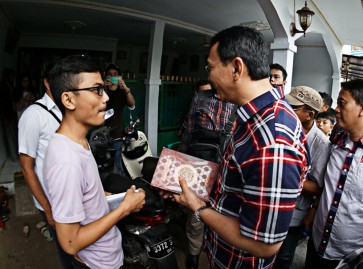Popular Reads
Top Results
Can't find what you're looking for?
View all search resultsPopular Reads
Top Results
Can't find what you're looking for?
View all search resultsIslamic or Muslim leader?
Which one is more important, Islamic values or Muslim themselves? If we bring it to politics, the question is: which one is more important, Islamic or Muslim leadership?
Change text size
Gift Premium Articles
to Anyone
M
uhammad Abduh, an Islamic reformer from Egypt, once said “I went to the West and saw Islam, not Muslims. I returned to the East and saw Muslims, not Islam.”
His statement triggers the question: which one is more important, Islamic values or Muslim themselves? If we bring it to politics, the question is: which one is more important, Islamic or Muslim leadership?
Since the era of the struggle for independence until today, Indonesian Muslims have been divided when responding to Western values such as democracy. The first group, the formalists, insists Islam should be manifested in political life. The second group, the substantives, says Islamic values are more important than Islamic symbols in sociopolitical life.
The formalists believe Islamic symbols play a pivotal role in their struggle. That is why they campaign for Islamic labels in various aspects of Indonesian life. The word “sharia,” for instance, is now in use not only in private matters such as worship but also in muamalah (business transactions). Sharia banks are the most obvious example.
On the contrary, the substantive group does not care about such Islamic labels. For them, what matters the most is the implementation of Islamic values even though in a secular form. The country, for example, does not have to be Islamic, but as long as it upholds the law and justice for all it is Islamic enough.
The public has been dragged into the classic argument about whether the capital city Jakarta should be led by a Muslim governor. Following the Feb. 15 Jakarta gubernatorial election, discourse about Muslim versus non-Muslim leaders has continued to heat up rather than subside, simply because the runoff scheduled for April 19 will pit Basuki ”Ahok” Tjahaja Purnama, a Christian and Chinese-Indonesian, against Anies Baswedan, a Muslim.
If we look at Quranic teachings, for instance in Surah al-Baqarah: 124, we will find that the first requirement for becoming a leader is not committing injustice. It means the leader must uphold justice for all.


















